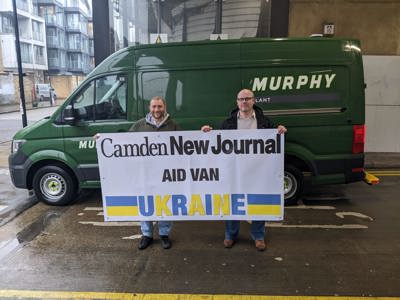
CNJ Food Aid Van (Covid + Ukraine)
Camden New Journal
The van went back into the garage as the threat of Covid was reduced and the lockdown lifted, but then came the war in Ukraine. Our readers in Camden watched in horror at the unfolding war and the images of people fleeing Putin's bombs with only the clothes they were wearing. They felt helpless. We all did. But then we remembered our food aid van and decided to make the project international. Dan Carrier, our long-serving, spirited reporter, researched where the refugee camps were forming in neighbouring Poland and the 2,500 mile trip that would need to be undertaken. We ran appeals in print and the donations flowed in, and we will never forget the generosity from people living in north London. There were basic supplies, food and messages of solidarity in our van. It was an unconventional campaign – usually, our coverage is about saving public swimming pools, libraries and hospital accident and emergency departments. But Dan's reporting from the edge of the warzone struck a chord with our readers. They felt that they had helped if even in a small way. Once the van was empty, Dan used cash donations to buy further stock in Poland and went back to the frontline – and he even helped a family escape the terror on the way back. The coverage is detailed in the pdfs provided and won praise from the community, politicians and, perhaps most satisfyingly, fellow journalists. But none of that really mattered: the Ukrainian people, fellow human beings going through something so unthinkable, could provide the only testimonials we needed. And their gratitude was obvious as they collected the donations and the van unloaded. In some ways, just knowing people cared, even though a continent stood between them, clearly meant so much. They had not been forgotten. When it came to this horrific war, we can say – and Camden can say – we did our bit.